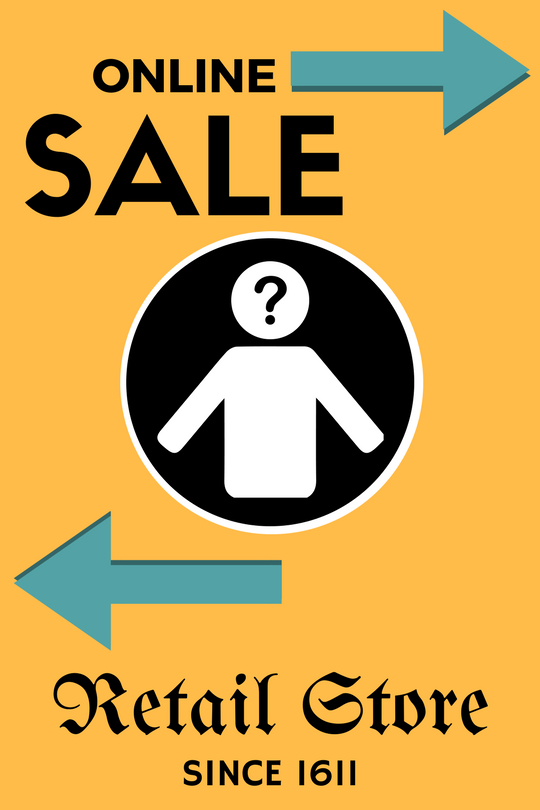One of the most important business decisions you’ll need to make: to sell online through an e-commerce store, or through a brick-and-mortar store. Selling online and selling through a physical store is completely different in terms of customer interaction, hiring employees, and marketing your products. So, it is important to plan ahead.
Any business will be foolish to ignore online channels today. Online retail is growing at an astounding rate, and most well-established stores have already started, or are starting their e-commerce platforms.
However, there’s still a major section of the population who still prefer to shop offline.
Contents
Choosing Right: Offline vs. Online Shopping

The ultimate choice depends on a number of factors like your business goals, the products you want to sell, your target audience, and the capital available for investment. Both online stores and physical stores have their share of advantages and disadvantages.
Let’s take a closer look at these.
Online Retail
Advantages
Low Upfront Costs
The costs involved in setting up an online store are significantly lower than when setting up a physical store. You don’t need a large physical space, and all the other associated costs. You can get started easily and quickly when you opt for online retail.
There are e-commerce store builders that help you in setting your store. From helping you to design your website to integrating payment gateways, these builders do most of the work on your behalf.
When you choose a builder like Shopify, most of your ‘setting up’ work is taken care of. Shopify lets you choose a domain name, register it, build your website, sell on social media, and more. Go to their website to learn how to open a business online.
Sell 24×7
Your customers don’t need to worry about the opening or closing times of your store; they can shop at their own convenience. More selling time means higher sales.
Wider Reach
Another reason to consider selling online is the fact that you have a wider audience to cater too, in terms of geographical area. In fact, you can even sell beyond your national boundary when you have an online store.
Many customers won’t visit stores that are too far from their homes, unless you sell something unique. Reaching such customers is easy when you have an online outlet.
Easy Collection Of Data
Customers enter at least their email IDs to shop from online stores.
You also can understand your customers better by tracking their online purchasing behavior, which isn’t possible with a physical store. In fact, tracking any kind of customer data offline isn’t easy. Most customers aren’t comfortable sharing their email IDs and phone numbers.
The fact that you have access to their data can elevate marketing efforts and improve revenues.
Sell At More Than One Place
When you have an online store, you can also sell through social media platforms like Facebook and Twitter.
In fact, you can even direct more traffic to your e-commerce website from social media pages. Also, you’ll find your customers promoting your products on social media with the help of the ‘share button’. This too affects your sales in a positive way.
Disadvantages
More Marketing Efforts
Online stores don’t have a physical location. Sometimes, it becomes difficult to drive customers to your store. It requires aggressive marketing; and you’ll need considerable resources.
Even if you’re planning to see through third-party websites like eBay or Amazon, you’ll have to share a percentage of your profit with them.
The Trust Factor
Trust is one major factor that doesn’t work in the favor of online stores, unless you make special attempts. With the increase in online fraud and security issues, you’ll need to go that extra mile to ensure that people trust your store.
Offline Retail
Advantages
Trust
It’s natural for customers to trust a product that they can touch and feel. A traditional brick-and-mortar store can craft a unique experience for their customers, which isn’t possible with an online store.
Instant Sale
When you have a physical presence, you can trade without having to invest too much on marketing. If you have a great store location, you don’t need to worry about much.
Disadvantages
Higher Setup Costs
The costs required to set up a physical store are higher. Running costs also tends to get higher, what with bills like water charges, electricity charges, and rent.
Location
Having a great location is a virtue. However, if the location isn’t right, you store won’t see too many customers.
What To Choose?
Recent trends show established brands starting their online stores, as well as offline stores investing in brick-and-mortar outlets. So, what should you go for?
The future is, of course, in omnichannel retail. Today’s customers prefer to interact with the sellers across various platforms—both digital and physical. It’s always a better idea to start online; the initial costs involved are much lesser. You can then move into the brick-and-mortar space.
